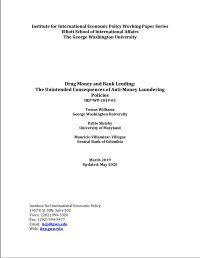Drug Money and Bank Lending: The Unintended Consequences of Anti-Money Laundering
By Tomas Williams, Pablo Slutzky, and Mauricio Villamizar-Villegas
We explore how anti-money laundering (AML) policies affect banks and credit provision to firms. For identification we exploit the enactment of a financial regulation in Colombia. Aimed at controlling the flow of money from drug trafficking into the financial system, we find that after implementation bank deposits in municipalities with high drug trafficking decline. This negative liquidity shock has consequences for credit in other municipalities. Banks sourcing their deposits from areas with high drug trafficking cut lending relative to other banks. Using a proprietary database containing data on bank-firm credit relationships, we show that small firms that rely on credit from affected banks experience a negative shock to sales, investment, and profitability. Furthermore, we use night-lights data to show that these results are not due to a reallocation of activity across firms nor between the formal and informal sectors. Our evidence uncovers a hidden to be considered when implementing AML policies.
Washington, DC: Elliott School of International Affairs, The George Washington University, 2020. 62p.


